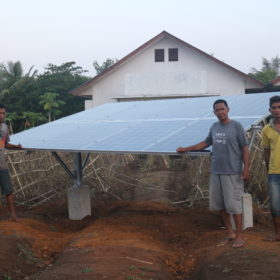
Indonesia's Central Bureau of Statistics reported in 2018 that 2,281 villages had no access to electricity. With more than 17,000 islands, building grid connections between them would be expensive. So what are the key challenges and solutions to the development of rural area electrification in Indonesia? pv magazine interviewed three experts that are involved in developing the country's rural area electrification.
Read the first two interviews, which were published separately, here:
Interview three:
 Andre Susanto is the founder of a company named Inovasi Dinamika Pratama. He recently finished two smart micro-grids in Papua and Sumba. Currently, he is deploying solar PV water pumps in Papua and also managing contract operation and maintenance for modular smart micro-grid topology in 11 different locations in Indonesia with a capacity of almost 500 kWp. He is also developing rural area collaboration for a productive use of energy in eco-tourism, coffee packaging, and processing local agricultural products.
Andre Susanto is the founder of a company named Inovasi Dinamika Pratama. He recently finished two smart micro-grids in Papua and Sumba. Currently, he is deploying solar PV water pumps in Papua and also managing contract operation and maintenance for modular smart micro-grid topology in 11 different locations in Indonesia with a capacity of almost 500 kWp. He is also developing rural area collaboration for a productive use of energy in eco-tourism, coffee packaging, and processing local agricultural products.
pv magazine: What are the challenges in electrifying rural areas in Indonesia?
Andre Susanto: Some of the challenges are telecommunications for remote monitoring and social problems, such as land ownership, the regularity of payments, theft or vandalism, and even the fact that gaps in electricity supply between villages can cause jealousy. Determining the village electricity needs can also be challenging.
There is a risk of delayed payments that can cause a burden on my credit standing. We are also looking for partners for the productive utilization of energy to develop economic activities in rural areas.
What is the appropriate business model for electrification in Indonesia’s rural areas?
The business models that are appropriate for rural communities depend on the needs of the community, income means, how much electricity will they use. Sometimes they even show resistance against electrification.
There is no single business model that is perfect for all communities. What you need to do is to identify the different components of the business model, e.g. who pays for what on the capital expenditure, who will collect the money, what technologies will be used, what are the communities perception and social norms. We need to separate the method of payment, for example prepaid vs. postpaid, from what they will pay for, such as packages of kWh, per kWh usage, weekly or monthly subscriptions with daily limits.
Do you think the recent regulation on rural area development access has a significant role in developing Indonesia’s off-grid electrification?
No, because the business area license that is required for a private sector company to be able to sell electricity directly to the consumers is difficult to get. But it is not only about this regulation, because rural electrification is a highly risky endeavor, so should there be government subsidies? Should that government subsidy be channeled into private sector companies, or should it be channeled through state own electric company (PLN)? This regulation by itself is not limiting rural electrification growth, but this regulation requires additional regulations from other ministries to allow PLN and the Ministry of Energy to be able to deploy effectively rural electrification projects.
How do the communities respond to your project?
In the beginning, they want to be involved, and they are excited to have electricity. But after a while, the energy use tapers off to a plateau, and it is even possible to come down from the peak energy use. I am not saying people are not happy with electricity and they do not use electricity. What I am saying is that people often do not know how to productively and sustainably use electricity. They are not sure what else to use electricity for that is aligned with their culture, behavior, and social norms.
Interview by Sorta Carol
Lắp đặt điện mặt trời Khải Minh Tech
https://ift.tt/2X7bF6x
0906633505
info.khaiminhtech@gmail.com
80/39 Trần Quang Diệu, Phường 14, Quận 3
Lắp đặt điện mặt trời Khải Minh Tech
https://ift.tt/2ZH4TRU
Không có nhận xét nào:
Đăng nhận xét